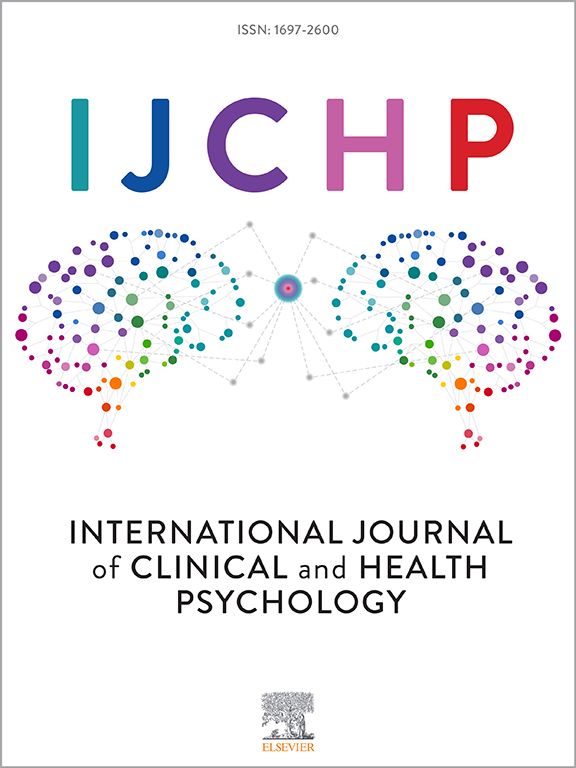Optimism, sleep quality, physical activity, and cancer-related cognitive impairment in middle-to-older aged patients undergoing breast cancer treatment
IF 4.4
1区 心理学
Q1 PSYCHOLOGY, CLINICAL
International Journal of Clinical and Health Psychology
Pub Date : 2025-09-24
DOI:10.1016/j.ijchp.2025.100626
引用次数: 0
Abstract
Background
Patients with breast cancer (BC) are at risk for cancer-related cognitive impairment (CRCI) due to BC-related stress and cancer treatment. Optimism and positive health behaviors may mitigate CRCI. This study examined relationships between optimism, health behaviors (sleep quality and physical activity) and CRCI in BC patients during the post-surgical period and whether optimism and health behaviors interacted in this relationship.
Methods
Women with recently diagnosed BC enrolled in a stress management trial following BC surgery. At baseline, participants completed questionnaires that measured CRCI, optimism, sleep quality, and physical activity.
Results
79 patients were enrolled (M = 61 years; range=50–85). Multiple regression models controlling for patient age, stage, surgery type, body mass index, and comorbidities revealed that optimism was associated with fewer perceived cognitive impairments (β=0.32, p=.01) and greater perceived cognitive abilities (β=0.38, p=.001). Poorer sleep quality was associated with poorer perceived cognitive abilities (β =-0.37, p=.01) and greater impact of cognitive impairments on quality of life (β=-0.39, p=.01). Moderation models revealed an interaction between optimism and sleep quality on perceived cognitive impairments (β=2.06, p=.02), such that among those low in optimism, poorer sleep quality was associated with greater perceived cognitive impairments (b=-2.42, p=.01) but not among those with high optimism (p=.46). No other models were statistically significant.
Conclusions
Results suggest that optimism and sleep quality may be associated with better cognitive function in BC patients in the post-surgical period. Interventions that improve optimistic expectancies and sleep quality may help to mitigate CRCI in mid-to-older BC patients initiating treatment.
接受乳腺癌治疗的中老年患者的乐观、睡眠质量、身体活动和癌症相关认知障碍
乳腺癌(BC)患者由于BC相关的应激和癌症治疗有发生癌症相关认知障碍(CRCI)的风险。乐观和积极的健康行为可减轻CRCI。本研究探讨了术后BC患者的乐观、健康行为(睡眠质量和身体活动)和CRCI之间的关系,以及乐观和健康行为是否在这种关系中相互作用。方法新近诊断为BC的女性在BC手术后参加了一项压力管理试验。在基线,参与者完成了测量CRCI、乐观、睡眠质量和身体活动的问卷调查。结果纳入79例患者(年龄61岁,范围50 ~ 85岁)。控制患者年龄、分期、手术类型、体重指数和合并症的多元回归模型显示,乐观与感知认知障碍较少(β=0.32, p= 0.01)和感知认知能力较高(β=0.38, p= 0.001)相关。较差的睡眠质量与较差的认知能力相关(β= -0.37, p= 0.01),认知障碍对生活质量的影响更大(β=-0.39, p= 0.01)。适度模型揭示了乐观和睡眠质量对认知障碍的影响(β=2.06, p= 0.02),因此在乐观情绪较低的人群中,较差的睡眠质量与较大的认知障碍相关(b=-2.42, p= 0.01),但在乐观情绪较高的人群中则没有这种关系(p= 0.46)。其他模型均无统计学意义。结论乐观和睡眠质量可能与BC患者术后认知功能改善有关。改善乐观预期和睡眠质量的干预措施可能有助于减轻开始治疗的中老年BC患者的CRCI。
本文章由计算机程序翻译,如有差异,请以英文原文为准。
求助全文
约1分钟内获得全文
求助全文
来源期刊

International Journal of Clinical and Health Psychology
PSYCHOLOGY, CLINICAL-
CiteScore
10.70
自引率
5.70%
发文量
38
审稿时长
33 days
期刊介绍:
The International Journal of Clinical and Health Psychology is dedicated to publishing manuscripts with a strong emphasis on both basic and applied research, encompassing experimental, clinical, and theoretical contributions that advance the fields of Clinical and Health Psychology. With a focus on four core domains—clinical psychology and psychotherapy, psychopathology, health psychology, and clinical neurosciences—the IJCHP seeks to provide a comprehensive platform for scholarly discourse and innovation. The journal accepts Original Articles (empirical studies) and Review Articles. Manuscripts submitted to IJCHP should be original and not previously published or under consideration elsewhere. All signing authors must unanimously agree on the submitted version of the manuscript. By submitting their work, authors agree to transfer their copyrights to the Journal for the duration of the editorial process.
 求助内容:
求助内容: 应助结果提醒方式:
应助结果提醒方式:


